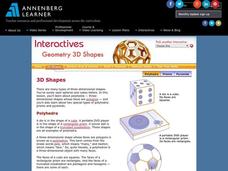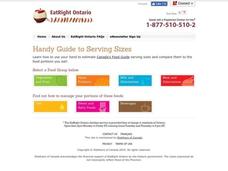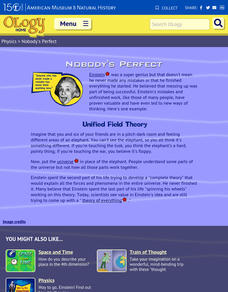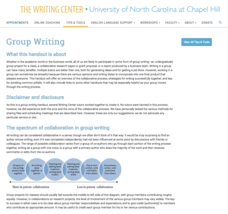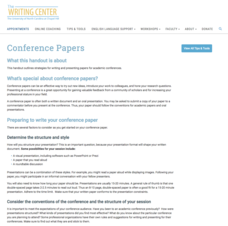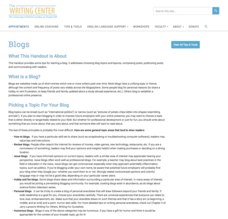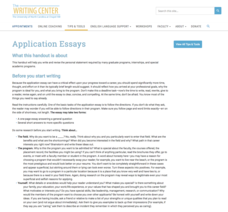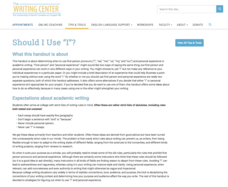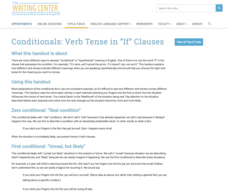Annenberg Foundation
Geometry 3D Shapes: Surface Area and Volume
Whether you wrap it or fill it, you're using geometric concepts. Classmates use an interactive approach to learn how to find volume and surface area of cylinders and prisms in the second lesson in a five-part series. The online lesson...
Annenberg Foundation
Geometry 3D Shapes: 3D Shapes
Explore vocabulary related to three-dimensional shapes. An instructional website describes the characteristics of different geometric solids. Learners can use an interactive component to view nets, faces, vertices, and edges of common...
Eat Right Ontario
Handy Guide to Serving Sizes
Always know the right amount to eat with help from an engaging and informative website. Browse food categories— vegetables and fruits, grains, dairy, meat, fats, sweet and salty treats, and beverages—to discover how to measure a proper...
National Constitution Center
Interactive Constitution
Did you know there are seven Articles and 27 Amendments to the US Constitution? Explore each and every one of them, including the Bill of Rights and other rights around the world, in a super neat US Constitution interactive.
Why Christmas
Christmas Around the World
Discover how the world celebrates Christmas with an interactive website that takes scholars on a journey through several different countries' holiday festivities.
American Museum of Natural History
A Closer Look at Mars
A website looks at how we know so much about Mars—telescopes, robots, and spacecraft—and the search for martian life. Following the informational text are three questions that quiz pupils about possible life on Mars.
American Museum of Natural History
Nobody's Perfect
Even Einstein made mistakes, you know. A remote learning resource explains how scientists are sometimes unsuccessful. Pupils learn about Einstein's failed quest to find a unified field theory that explained the entire universe.
American Museum of Natural History
Einstein in Time
Einstein sure had an interesting life. Using a remote learning resource, pupils examine a timeline of Einstein's life. They learn about the major scientific discoveries as well as humanitarian and social work. Additionally, they read...
University of North Carolina
Group Writing
Two heads are better than one, especially during the writing process. Sometimes, scholars benefit from participating in group writing assignments, as one of the handouts in a series on specific writing assignments outlines. The process...
University of North Carolina
Business Letters
A business letter may be the key receiving a job offer or making a major deal. A writing handout, part of a series of handouts on specific types and styles, shares some of the key components involved with writing a business letter. The...
University of North Carolina
Scientific Reports
IMRAD isn't text-speak for I'm cool. It's actually the format for scientific reports. As part of a larger series on specific writing assignments, an informative handout explains the nuts and bolts of writing a lab report. First, however,...
University of North Carolina
Letters of Recommendation
Letters of recommendation play a key role in the college admissions process. A handout on the topic, part of a series on specific writing assignments, helps applicants through the process of choosing recommenders and requesting a letter....
University of North Carolina
Conference Papers
In the world of academia, conference papers and presentations play a big role. It's through conference papers that professors and graduate assistants share their research with others in the field. A handout on conference papers, part of...
University of North Carolina
Curricula Vitae (CVs) versus Resumes
The term curricula vitae might sound more sophisticated than the term resumes, but that doesn't mean it's the preferred document to send to potential employers. As explained in a handout on curricula vitae (CV) versus resumes, part of a...
University of North Carolina
Blogs
The blogosphere may be overwhelmed with content, but there's still room for unique points of view. Creating a blog that stands out, however, is the bigger challenge. A handout on blogs, part of a series of handouts on specific writing...
University of North Carolina
Application Essays
There's a lot riding on good writing! Often, an application essay is the difference between acceptance and rejection. As part of a series on specific writing assignments and contexts, a handout helps scholars craft the perfect personal...
University of North Carolina
Should I Use “I”?
Despite the formal nature of academic writing, personal pronouns frequently appear in high school and college papers. While your first instinct may be to cross them out, sometimes it's okay to use them, an idea covered in a handout that...
University of North Carolina
Conditionals: Verb Tense in “If” Clauses
"If you give a mouse a cookie, then he's going to ask for a glass of milk." These iconic words from Laura Numeroff's classic tale offer a great example of conditionals, a topic covered in the handout as part of a larger writing series...
University of North Carolina
Relative Clauses
Knock, knock. Who's there? To. To who? No! To whom. Knowing when to use who versus whom is just one of the many topics covered on a handout about relative pronouns. Writers discover how to incorporate words such as whose, that, which,...
University of North Carolina
Brainstorming
Did you just hear thunder? Nope, you heard the sound of another kind of storm—a brainstorm! A handout teaches writers about different kinds of brainstorming and provides options for them to try when beginning to write their own papers....
Curated OER
Bermuda Triangle
Young scholars explore what the Bermuda triangle is and the theories as to why it is so mysterious. In this mystery lesson students read and discuss the history and the mystery behind the Bermuda Triangle.
Spark Notes
The Interwar Years (1919-1938): Study Questions
In this online interactive history worksheet, students respond to 10 short answer and essay questions about years between World Wars I and II.



